The Wolf Gift Read online
Page 6
She went on mumbling about the total lack of hair or fur samples. “Now you know there had to have been fibers at that scene, animal fibers.”
Reuben heard that panting breath again. Then the silence. There had been no smell of an animal, but there had been the feel of one, of hair, the long thick coat of a dog or a wolf against him. Maybe a mountain lion. But no scent of a mountain lion. Don’t mountain lions have a scent? How would they ever know?
Grace was thankful the paramedics had thoroughly cleaned up Reuben’s wounds. That was only proper. But certainly they could get a decent sampling from the bites on the dead men that would tell them whether the animal had been rabid or not.
“Well, they had a massacre on their hands, Grace,” said Celeste. “They weren’t thinking about rabies.”
“Well, we have to think about rabies, and we’re beginning the rabies protocol now.” It wasn’t nearly as painful as it had been in the old days, she assured Reuben. He’d have to take a series of injections for twenty-eight days.
Rabies was almost uniformly fatal once the symptoms presented. There was no choice but to treat for rabies at once.
Reuben didn’t care. He didn’t care about the deep pain in his gut, his aching head, or the ice pick of pain that kept stabbing his face. He didn’t care about the nausea he felt from the antibiotics. All he cared about was that Marchent was dead.
He closed his eyes and he saw Marchent. He heard Marchent’s voice.
He couldn’t quite grasp that all life had gone out of Marchent Nideck just that quickly, and that he himself was somehow improbably still alive.
They wouldn’t let him watch television news till the next day. People in Mendocino County talked about wolf attacks that happened every few years. And then there were bears up there, no one could deny. But folks in the vicinity of the old house put their money on a mountain lion they’d been tracking for the last year.
The fact was, no one could find the animal, whatever it was. They were combing the redwood forest. People claimed to have heard howling in the night.
Howling. Reuben remembered those gnashing growls and snarls, that savage torrent of sound when the beast had descended on the brothers, as though it could not kill in silence, as if the sounds were part and parcel of its lethal strength.
More medication. More painkillers. More antibiotics. Reuben lost track of the days.
Grace said she wondered if plastic surgery would even be necessary. “I mean this bite has healed remarkably. And I must say, the incision in your stomach is healing too.”
“He ate all the right things growing up,” said Celeste. “His mother is a brilliant doctor.” She winked at Grace. It pleased Reuben so much that they liked each other.
“Yes, indeed, and she can cook!” said Grace. “But this is just marvelous.” Gently her fingers moved through Reuben’s hair. Gingerly she touched the skin on his neck and then on his chest.
“What is it?” Reuben whispered.
“I don’t know,” Grace said absently. “Let’s say you don’t need any vitamins through that IV.”
Reuben’s dad sat in the corner of the hospital reading Leaves of Grass by Walt Whitman. Now and then he said something like, “You’re alive, son, that’s what matters.”
Everything might be healing, but Reuben’s headache got worse. He was never fully asleep, only half asleep, and he overheard things he didn’t understand.
Grace talking somewhere, perhaps to another doctor. “I see changes, I mean, I know, this has nothing to do with the rabies virus, of course, we have no evidence he’s contracted it, but well, you’ll think I’m crazy but I could swear that his hair is thicker. You know, the bite marks, well, I know my son’s hair, and my son’s hair is thicker, and his eyes …”
He meant to ask her, What are you talking about, but only thought about it dully with a multitude of other tormenting thoughts.
Reuben lay there speculating. If drugs could really numb your consciousness, they’d be a good thing. As it was, they slowed you down, confused you, kept you vulnerable to violent flashes of recall, and then agitated you and made you unsure of what you knew and didn’t know. Sounds startled him. Even smells woke him from his shallow uneasy sleep.
Fr. James rushed in a couple of times a day, always late for something back at his church, and with just enough time to tell Reuben he was obviously improving and looking better and better. But Reuben saw something in his brother’s face that was entirely new; a kind of fear. Jim had always been protective of his younger brother, but this was deeper. “I gotta say, though,” said Jim, “you do look quite ruddy and robust for someone who’s been through all this.”
Celeste did as much hands-on care as he would allow. She was amazingly capable. She fed him Diet Coke through a straw, adjusted his covers, wiped his face over and over, and helped him up for his required walk around the ward. She slipped out again and again to call the D.A.’s office, and then she’d be back assuring him he had nothing to worry about. She was efficient, matter of fact, and never got tired.
“The nurses have voted you the most handsome patient on the ward,” she told him. “I don’t know what they’re giving you here, but I could swear your eyes are actually a deeper shade of blue.”
“That’s impossible,” he said. “Eyes don’t change color.”
“Maybe drugs can change them,” she said. She kept looking at him, not in his eyes, but at them. It made him slightly uneasy.
Speculation about the mysterious animal continued. Couldn’t Reuben remember anything else, asked his editor Billie Kale, the feminine genius behind the San Francisco Observer. She stood beside his bed.
“Honestly, no,” Reuben said, pushing hard against the drugs to look and sound alert.
“So it wasn’t a mountain lion, you’re sure of that?”
“Billie, I saw nothing, I told you.”
Billie was a short, rotund woman, with neat white hair and expensive clothes. Her husband, after a long career, had retired from the state senate and bankrolled the paper, giving Billie a second chance at a meaningful life. She was a terrific editor. She looked for an individual voice in each of her reporters. She fostered that voice. And she had liked Reuben from the start.
“I never saw the creature,” said Reuben. “I heard it. I heard it and it sounded like a huge dog. I don’t know why it didn’t kill me. I don’t know why it was there.”
And that was the real question, wasn’t it? Why did this animal wander into the house?
“Well, those crazy junkie brothers tore out half a wall of dining room windows,” said Billie. “You should see the photos. What a pair, to murder their own sister like that. And the old woman in back. Good God. Well, look, you get to work on this when you can. You don’t look sick to me, by the way. What are they giving you?”
“I don’t know.”
“Yeah, well, I’ll see you when I see you.” She went out as abruptly as she’d come in.
When he got a moment alone with Celeste, Reuben volunteered the information about him and Marchent. But she’d already known, of course. It had made the papers, too. That was a blow to Reuben, and Celeste saw it.
“It’s not that bad,” she said. “Well, just forget that part.” She comforted him, as if he was the one who’d been wronged.
Reuben again waved away Celeste’s suggestion of legal counsel. Why did he need this? The attackers had beaten and stabbed him. Only the strangest sort of luck had saved his life.
He was almost right.
The fifth day after the killing, he was still in the hospital, his wounds almost healed, and the prophylactic antibiotics still making him wretchedly sick, when he was told that Marchent had willed the house to him.
She’d done this about an hour before she died, speaking with her San Francisco lawyers about it by phone, and faxing several signed documents to them, one of which had been witnessed by Felice, confirming her verbal instructions that the house should go to Reuben Golding, and that she would bear the full
cost of gift taxes on the transfer, which would leave Reuben in possession free and clear. She’d arranged for twelve months’ prepaid taxes and insurance.
She’d even made arrangements for her brothers to be paid the money they would have received in the event of a sale.
All the papers were found on her desk, along with a list she’d been making “for Reuben” of local vendors, service people, and suppliers.
Her last call had been to her man friend in Buenos Aires. She’d be coming home sooner than expected.
Seven and one-half minutes after that call, the local authorities had received the 911 alert: “Murder, murder.”
Reuben was quietly stunned.
Grace sat down wearily after hearing the news. “Well, it’s a white elephant, isn’t it?” she asked. “How will you ever sell it?”
In a small voice Celeste had said, “I think it’s kind of romantic.”
This did raise some questions with the authorities. And the Golding family law firm flew into action and response.
But no one really suspected Reuben of anything. Reuben was well off, and had never in his life received so much as a speeding ticket. His mother was internationally known and respected. And Reuben had almost died. The knife wound to his stomach had barely missed vital organs, his throat was badly bruised, and he’d sustained a concussion as well as the vicious animal bite that had almost opened his jugular vein.
Celeste assured him the D.A.’s office knew that no one could inflict that kind of harm on himself. Besides, they had motive for the brothers, and were able to find two confederates who confessed that they had heard about the scheme but thought the boys were just boasting.
Reuben had a solid reason for being on the property, an appointment set up with his editor, Billie, at the Observer, and there was no evidence anywhere on the premises that his contact with Marchent had been anything but consensual.
Hour after hour, he lay there in the hospital bed, going over all these different factors. Every time he tried to sleep, he found himself in a hellish tape loop, rushing down that staircase, trying to get to Marchent before her brothers did. Had she known that the men were her brothers? Had she seen through their disguise?
He woke up out of breath, every muscle aching from the strain of making that desperate run. And then all the pain in his face and gut would come back; he’d push the button for more Vicodin and fall again into half nightmare.
Then there were the voices and sounds that kept waking him. Someone crying in another room. A woman arguing furiously with her daughter. “Let me die, let me die, let me die.” He woke, staring at the ceiling, hearing that woman.
He could have sworn there was some sort of problem with the vents in this hospital, that he was hearing someone on a lower floor fighting off an attacker. Cars passing. He could hear them too. Raised voices.
“Drug delusions,” said his mother. “You’ve got to be patient with them.” She was adjusting the IV for the fluids she insisted he needed. She stared down at him suddenly. “I want to run some more tests.”
“What on earth for?”
“You may think me crazy, Baby Boy, but I could swear your eyes are a darker blue.”
“Mother, please. Talk about drug delusions.” He didn’t tell her that Celeste had said the same thing.
Maybe I’ve at last acquired a distinctive and tragic expression, he thought mockingly, a little gravitas.
She was staring at him as if she hadn’t heard him at all. “You know, Reuben, you really are a remarkably healthy boy.”
And he was. Everyone said so.
His best friend Mort Keller, from Berkeley, stopped in twice, and Reuben knew how much this meant, since Keller was facing his oral examination for the Ph.D. in English. This was the program Reuben had abandoned. And he still felt the guilt.
“You look better than I’ve ever seen you,” Mort said. He himself had bags under his eyes, and his clothes were wrinkled and even a bit dusty.
Other friends called—guys from school, guys from the paper. He didn’t really want to talk. But it was nice that they cared, and he did read the messages. The cousins from Hillsborough called, but he assured them they must not come in. Grace’s brother who worked in Rio de Janeiro sent a basket of brownies and cookies big enough to feed the entire ward. Phil’s sister, in a nursing home in Pasadena, was too sick to be told what was going on.
Personally, Celeste didn’t care at all about his sleeping with Marchent. She was militant with the investigating officers. “What are you saying, he raped her and then she went downstairs and made out a handwritten will leaving him a five-million-dollar piece of property? And then the woman gushed to a lawyer on the phone about all this for an hour? Come on, do I have to do the thinking for all of us here?”
Celeste told the press the same thing. He caught a glimpse of her on television, firing answers at the reporters, looking adorably ferocious in her little black suit and white ruffled blouse, her fluffy brown hair framing her small animated face.
Someday she’ll make legal history, he thought.
As soon as Reuben could keep some food down, Celeste brought him minestrone soup from North Beach. She was wearing the ruby bracelet he’d given her, and a bit of lipstick that was the same color as the ruby. She’d been dressing especially nicely for him all during this ordeal and he knew it.
“Look, I’m sorry,” he said.
“You think I don’t understand? Romantic coast, romantic house, romantic older woman. Forget about it.”
“Maybe you should be the journalist,” he murmured.
“Ah, now there’s that Sunshine Boy smile. I was beginning to think I’d imagined it.” She ran her fingers very gently over his neck. “You know, this is all healed. It’s like some kind of miracle.”
“You think?” He wanted to kiss her, kiss her smooth cheek.
He dozed off. He could smell food cooking, and then another fragrance, a perfume. That was his mother’s perfume. And then there were all these other smells that had to do with the hospital and its chemicals. He opened his eyes. He could smell the chemicals that had been used to bathe these walls. It was as if each fragrance had a personality, a distinct color in his mind. He felt like he was reading a code off the wall.
Distantly, the dying woman pleaded with her daughter, “Shut off the machines, I’m begging you.”
“Mommy, there are no machines,” said the daughter. The daughter cried.
When the nurse came in, he asked about the mother and the daughter. He had the oddest feeling—he didn’t dare tell her this—that the woman wanted something from him.
“Not on this ward, Mr. Golding,” she assured him. “Maybe it’s the drugs.”
“Well, just what drugs are they giving me? Last night I thought I heard two guys in a barroom fight.”
Hours later, he woke to find himself standing by the window. He’d accidentally ripped the IV out of his arm. His dad was dozing in the chair. Celeste was someplace far away talking rapidly on her phone.
“How did I get here?”
He was restless. He wanted to walk, to walk fast, not just down the hall, dragging that IV pole on wheels with him every step, but out of here and along a street, or into a woods, and along a steep path. He felt such an urge to walk it was painful to be confined here. It was agony suddenly. He saw the woods surrounding Marchent’s house, my house, and he thought, We’ll never walk there together, she’ll never get to show me so many things. Those ancient redwoods, those trees that are some of the oldest living things in this world. Oldest living things.
That woods was his now. He had become the guardian of those particular trees. An indefinable energy galvanized him. He began to walk, moving swiftly down the corridor, and past the nurses’ station and then down the steps. Of course he was wearing this flimsy hospital gown, tied in the back, thank God, but he certainly couldn’t go out for a stroll in the night. But it felt good to be pounding the stairs, making a circuit of another floor and another.
&n
bsp; He stopped suddenly. Voices. He could hear them all around him, gentle whispers, too low to interpret, but there, like rippling in water, like breeze moving through trees. Somewhere far off, someone was screaming for help. He stood there, with his hands over his ears. He could still hear it. A boy screaming. Go to him! Not in this hospital, but someplace else. Where else?
He was walking through the front lobby on his way out the door when the orderlies stopped him. His feet were bare. “Whoa, I don’t know how I got here,” he said. He was embarrassed, but they were kind enough as they took him back upstairs.
“Don’t call my mother,” he said ominously. Celeste and Phil were waiting for him.
“You went AWOL, son?”
“Dad, I’m so restless. I don’t know what I was thinking.”
The next morning, he lay half asleep listening. His mother was talking about the tests they’d run. “It makes no sense, a sudden surge of human growth hormone in a twenty-three-year-old man? And all this calcium in his blood, these enzymes. No, I know it’s not rabies, of course it’s not rabies, but I wonder if the lab didn’t simply make a mistake. I want them to run everything all over again.”
He opened his eyes. The room was empty. Silence. He got up, showered, shaved, looked at the wound on his abdomen. You could hardly see the scar.
More tests. There was no evidence now that he’d ever had a concussion.
“Mom, I want to go home!”
“Not quite yet, Baby Boy.” There was a very elaborate test that could find any infection in any part of the body. Took forty-five minutes. He’d have to lie perfectly still.
“May I call you Baby Boy, too?” whispered the nurse.
An hour later Grace came in with the laboratory technicians.
“Can you believe they have lost every single specimen they took?” She was “fit to be tied,” as she liked to say. “Now this time they’d better get it right. And we are not giving anyone another DNA sample. If they screwed that up, it’s their problem. Once was enough.”

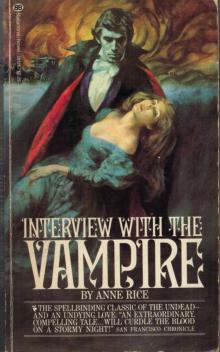 Interview with the Vampire
Interview with the Vampire Christ the Lord: Out of Egypt
Christ the Lord: Out of Egypt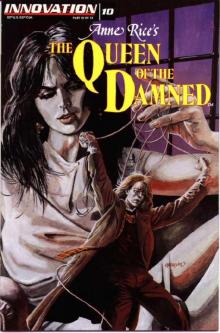 The Queen Of The Damned
The Queen Of The Damned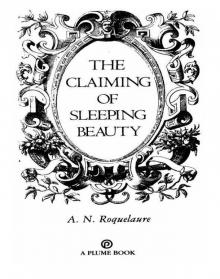 The Claiming of Sleeping Beauty
The Claiming of Sleeping Beauty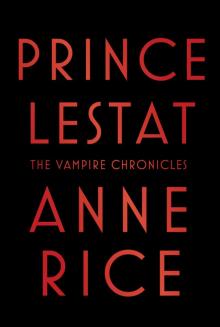 Prince Lestat
Prince Lestat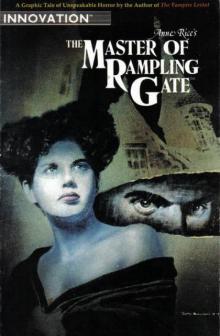 The Master of Rampling Gate
The Master of Rampling Gate The Vampire Lestat
The Vampire Lestat Blood Canticle
Blood Canticle Beauty's Release
Beauty's Release Pandora
Pandora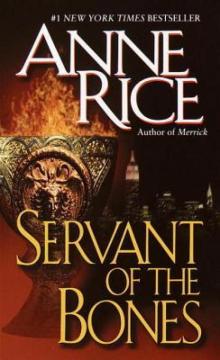 Servant of the Bones
Servant of the Bones Of Love and Evil
Of Love and Evil Beauty's Punishment
Beauty's Punishment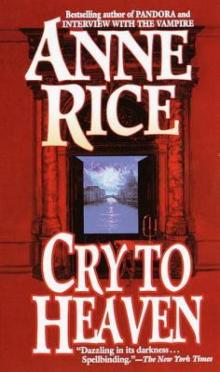 Cry to Heaven
Cry to Heaven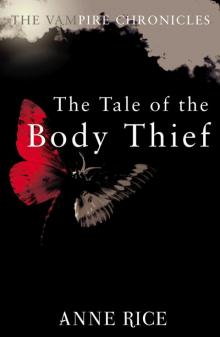 The Tale of the Body Thief
The Tale of the Body Thief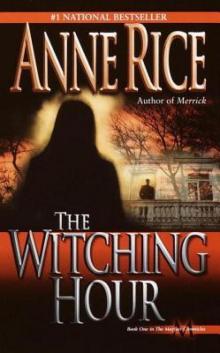 The Witching Hour
The Witching Hour Memnoch the Devil
Memnoch the Devil Blackwood Farm
Blackwood Farm Beauty's Kingdom
Beauty's Kingdom Belinda
Belinda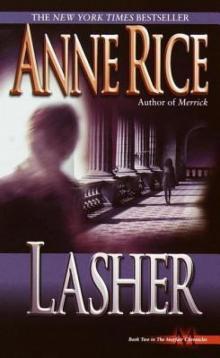 Lasher
Lasher Vittorio, the Vampire
Vittorio, the Vampire Angel Time
Angel Time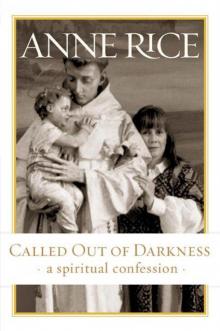 Called Out of Darkness: A Spiritual Confession
Called Out of Darkness: A Spiritual Confession Blood And Gold
Blood And Gold The Passion of Cleopatra
The Passion of Cleopatra Taltos
Taltos Exit to Eden
Exit to Eden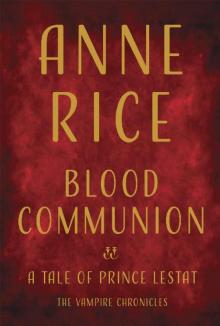 Blood Communion (The Vampire Chronicles #13)
Blood Communion (The Vampire Chronicles #13) The Wolf Gift
The Wolf Gift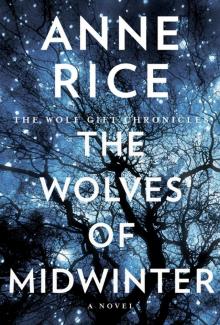 The Wolves of Midwinter
The Wolves of Midwinter Prince Lestat and the Realms of Atlantis
Prince Lestat and the Realms of Atlantis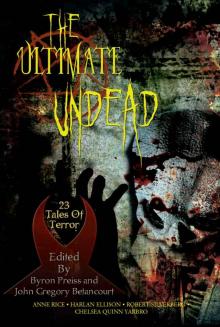 The Ultimate Undead
The Ultimate Undead The Vampire Lestat tvc-2
The Vampire Lestat tvc-2 The Road to Cana
The Road to Cana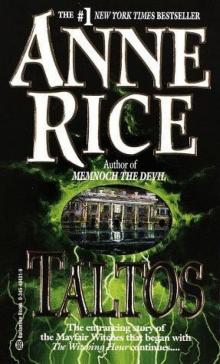 Taltos lotmw-3
Taltos lotmw-3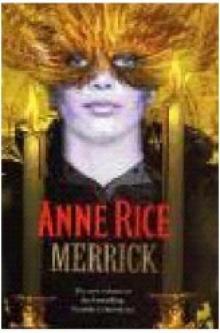 Merrick tvc-7
Merrick tvc-7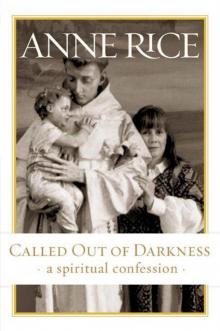 Called Out of Darkness
Called Out of Darkness Pandora - New Vampires 01
Pandora - New Vampires 01 Bllod and Gold
Bllod and Gold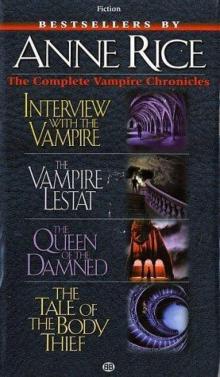 The Queen Of the Damned: Vampire Chronicles
The Queen Of the Damned: Vampire Chronicles The Sleeping Beauty Trilogy
The Sleeping Beauty Trilogy The Claiming of Sleeping Beauty b-1
The Claiming of Sleeping Beauty b-1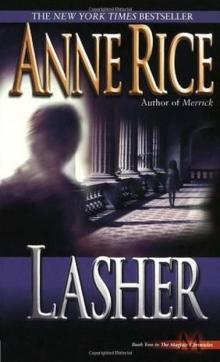 Lasher lotmw-2
Lasher lotmw-2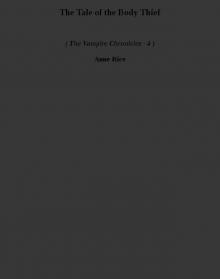 The Tale of the Body Thief tvc-4
The Tale of the Body Thief tvc-4 The Vampire Chronicles Collection
The Vampire Chronicles Collection Ramses the Damned
Ramses the Damned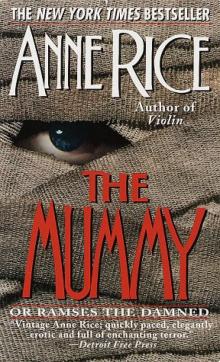 The Mummy - or Ramses the Damned
The Mummy - or Ramses the Damned Vittorio, The Vampire - New Vampires 02
Vittorio, The Vampire - New Vampires 02 The Vampire Armand tvc-6
The Vampire Armand tvc-6 Queen of the Damned tvc-3
Queen of the Damned tvc-3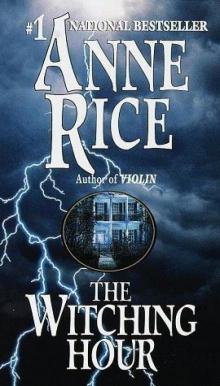 The witching hour lotmw-1
The witching hour lotmw-1 Feast of All Saints
Feast of All Saints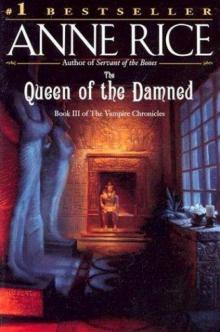 Queen of the Damned
Queen of the Damned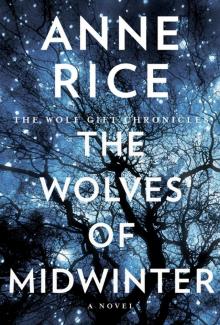 The Wolves of Midwinter twgc-2
The Wolves of Midwinter twgc-2 The Mummy
The Mummy Blood and Gold tvc-8
Blood and Gold tvc-8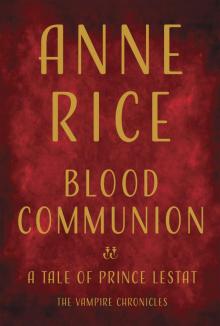 Blood Communion
Blood Communion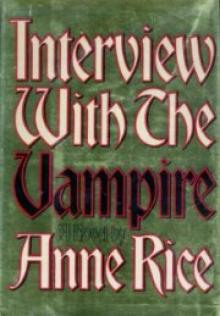 Interview with the Vampire tvc-1
Interview with the Vampire tvc-1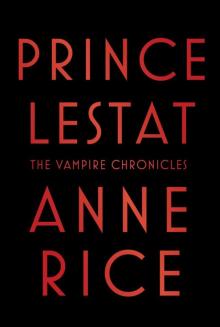 Prince Lestat: The Vampire Chronicles
Prince Lestat: The Vampire Chronicles